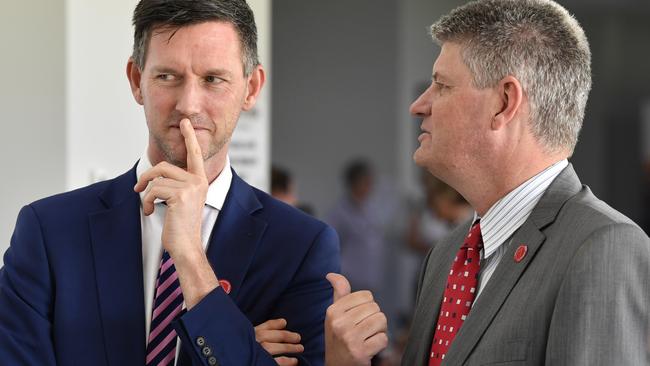Editorial: MPs’ perks and the magic money tree
The appointment of former ministers as chairs of two parliamentary committees will hurt the Miles government, writes the editor.

Opinion
Don't miss out on the headlines from Opinion. Followed categories will be added to My News.
There is no danger that voters will become less cynical than they already are about politicians while the taxpayer-funded parliamentary perks system that ensures every MP gets a special prize is still in place.
That the two former Palaszczuk government ministers who were not welcomed back into cabinet by new Premier Steven Miles are able to roll immediately back into new gigs that give them each a $67,000 a year boost to their $170,000-plus salaries as backbenchers is just the most recent example.
But it is one that will cut through, particularly in light of the jobs-for-mates controversy in recent weeks sparked by the new Premier hiring his predecessor’s director-general to oversee a review just weeks after she was paid out to leave, and his former chief of staff being given a newly created job that had not been advertised. Both were totally qualified for the jobs, but that was not the point. After an outcry, the review will now be done for free and the job offer has been rejected.
But the fuse has been lit. And the sense that this is a government that sees taxpayer money as coming from a magic replenishing money tree has taken hold among voters.
That is why the appointment of former ministers Mark Bailey and Stirling Hinchliffe as chairs of two parliamentary committees will hurt the Miles government.
Again, there is no suggestion that either MP is not up to the job. In fact, after serving years in cabinet, they are surely more qualified than their backbench colleagues who would otherwise have got the gigs.
The problem is they will now receive – on top of their already generous salaries – the equivalent of the median weekly earnings for Australian workers, for doing a job that most Queenslanders would probably think they should not demand more to do.
This is not a special deal. Every MP who chairs or serves on one of state parliament’s committees gets paid more to do so. But in the private sector, when a boss asks an employee to do a special task for them, their salary remains unchanged. It is just part of the job.
It’s a similar situation when it comes to the so-called “assistant ministers” in the Labor caucus who are paid an additional $93,000 – a stipend that is more than twice what the equivalent office holders in other states are paid.
What they do for that cash is unknown, with former premier Annastacia Palaszczuk having bluntly refused to release their diaries (a decision it is good to see Premier Miles plans to overturn).
But back to the committee chair jobs. What will gall Queenslanders most is that Mr Bailey has been handed a plum job as chair of the Education, Employment, Training and Skills Committee. Again, while he is no doubt qualified, his resume is that of perhaps Ms Palaszczuk’s most controversial minister.
He presided over massive cost blowouts on infrastructure projects, including a $2.4bn blowout (that he deliberately did not tell the public about) on the government’s now-$9.5bn program to build new trains in Maryborough, and a $3.1bn increase for the Gold Coast Faster Rail project that was meant to have cost just $2.6bn. On the second occasion, his justification was to bizarrely claim that Queenslanders do not care about the numbers as they just care that projects get built.
Try telling that to Mr Miles, who is set to pull the pin on an Olympic stadium that would have cost no more than each of those blowouts.
The final point worth making is that the reason parliamentary committees exist in the first place is ostensibly to provide opportunities for the opposition and crossbench MPs to ask questions on important government policy matters.
But you have to wonder about the Premier’s commitment to that with these appointments. Sadly, the truth is that both sides of politics consider committee chairs as gatekeepers between you and the truth.
MEDIA’S VITAL ROLE RECOGNISED
The extension of journalist shield laws to Crime and Corruption Commission proceedings in Queensland is a welcome – if long overdue – commitment by the Miles government.
The laws, which basically give journalists legal protection to maintaining the confidentiality of their sources, is an important step forward for democracy in this state.
Embarrassingly, Queensland has for some time been the only state in Australia not to afford these protections to members of the fourth estate simply doing their jobs and abiding by their code of ethics.
It means a reporter working with an anonymous whistleblower to uncover potential corruption can no longer be threatened with contempt of court if they are dragged before the CCC and refuse to divulge the identity of their source.
Following on from Mr Miles’ recent open justice announcements it is clear this is a premier who understands the important role professional journalism plays in society – a stark contrast to his predecessor.
Responsibility for election comment is taken by Chris Jones, corner of Mayne Rd & Campbell St, Bowen Hills, Qld 4006. Printed and published by NEWSQUEENSLAND (ACN 009 661 778). Contact details here




